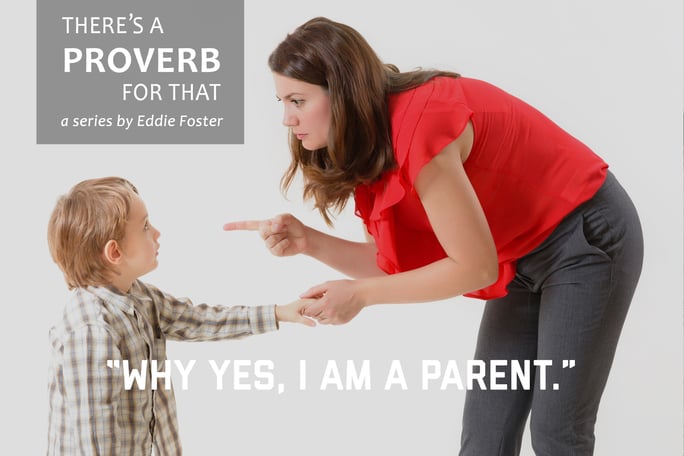There’s a Proverb for That: “Why, Yes, I Am a Parent”
Why are there so many opposing views on child rearing? Are you perplexed as to how to properly raise your child? Is there a proverb for that?

Endless parenting books, classes, seminars and a plethora of online message boards and Facebook groups try to help parents who are looking for help anywhere and anyway they can get it.
But an often-neglected source of guidance is the Bible. After all, one of the 10 Commandments is dedicated to the parent/child relationship (Exodus 20:12)—so God obviously places high value on the topic. And there’s also a proverb for that!
Proverbs and implications
1. Proverbs 13:24: “If you love your children, you will correct them; if you don’t love them, you won’t correct them” (Contemporary English Version).
This proverb gets to the heart of the importance of positively intervening in the development of our children through correction. Letting a child grow up without protective restraint and corrective feedback is setting that child up for monumental failures and obstacles in life. This proverb is making the point that correction is so vital to a child that a parent would be unloving to neglect it.
Letting a child grow up without protective restraint and corrective feedback is setting that child up for monumental failures and obstacles in life.
Another proverb says this must start early, “while there is hope” (Proverbs 19:18). The longer we allow our children to operate without correction, the more we endanger their future.
Implications: Don’t be that parent that didn’t teach kindness, manners and common decency to the next generation. Every parent has to determine the methods of discipline that work best with their children—the methods they will consistently use to help their little human beings learn right and wrong and cause and effect. As with all things, we must imitate God by being just and consistent, while also being merciful and loving. (For more on this, see our article “Disciplining Children.”)
2. Proverbs 22:6: “Train up a child in the way he should go, and when he is old he will not depart from it.”
This proverb mentions the benefits of early intervention in our children’s lives and the long-term effect it has. Start them early by teaching them everything from basic life skills to morals and character. Wisdom in how to best use our skills, resolve conflicts and do the right thing in different situations is not inherent—it must be taught. But, ultimately, as another proverb mentions, a child that is taught to be wise and righteous will give a parent reason to rejoice (Proverbs 23:24).
Implications: Teaching moments pop up all the time, so use them! When you hear someone insult someone else, that’s a perfect opportunity to talk about kindness. The recent U.S. election was a perfect opportunity for teaching children how not to behave in many situations, especially conversations and dealing with people we don’t like.
Exemplify God’s characteristics by showing the reasons good decisions lead to good results and bad decisions lead to bad results. We also need to be careful to model what is right in our own lives—because example, combined with teaching, is a powerful tool in a parent’s toolbox.
3. Proverbs 20:11: “Even a child is known by his deeds, whether what he does is pure and right.”
Children start out not being mentally or developmentally capable of certain behaviors. For example, a child’s first year is full of such “joys” as refusing to go to sleep, producing thousands of soiled diapers and crying for hours—leading exhausted parents to ask, “What in the world do you want?” These belong in the category of “welcome to parenthood; we promise it gets easier.”
However, when the child achieves mental capability and developmental milestones, continued poor behavior is cause for alarm. Other proverbs mention how children who mistreat their parents bring shame and reproach (Proverbs 19:26) and how children should listen to their parents (Proverbs 1:8; 6:20).
Implications: Avoid making excuses for your children’s poor behavior. Even if we as parents are working on our children’s bad conduct but have not yet helped them master the problem, it is never a good idea to deny or ignore a problem. If our children are kicking adults or running when we have told them not to, we should not excuse them by saying they just “get cranky when they are tired” or that he is just a “boy being a boy.” We must realize they are also disobeying and demonstrating poor and disrespectful behavior. People are more patient with struggling parents who are working with their children’s problems than with parents who seem to ignore or tolerate these issues.
Plenty more where those came from
There are many proverbs dealing with parenting, whether directly or indirectly, and they have a central theme: “The best parenting is done with hands-on intervention in training, correction and identification of what needs to be changed and developed in children.” When the challenges of raising small humans get us down, remember, there’s a proverb for that.
For further insight on parenting from the Bible, read the articles at “Practical Tips for Positive Parenting.”
Read the next blog post in this series: There’s a Proverb for That: “Mawidge Is What Bwings Us Togewer Today”
Date Posted: February 6, 2017

 by Eddie Foster
by Eddie Foster

